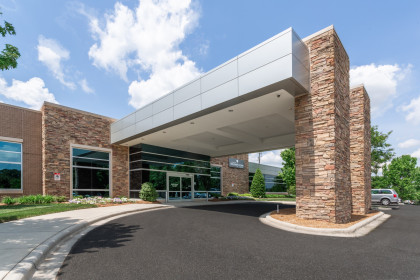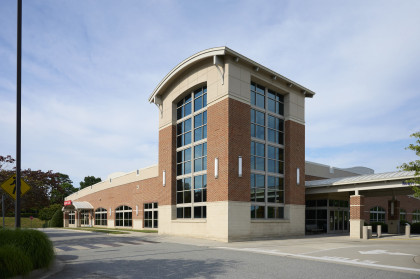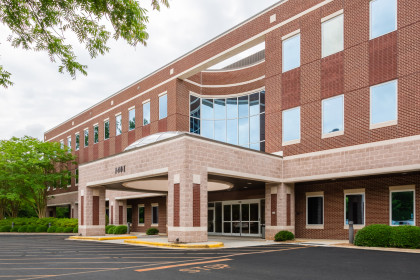Cranial
In addition to brain tumors, the neurosurgeons of Carolina Neurosurgery & Spine Associates diagnose and treat a variety of brain-and-skull-related disorders and injuries. From relieving the intense facial pain of trigeminal neuralgia, to reversing the effects of normal pressure hydrocephalus, which mimics the symptoms of Alzheimer's Disease, our practice remains committed to developing and delivering effective treatments.
To learn more, click one of the links above or call 800-344-6716 (Charlotte area) or 336-272-4578 (Greensboro area).
Its Symptoms, Diagnosis And Treatment
Hydrocephalus occurs when there is an excess accumulation of cerebrospinal fluid (CSF) in the brain. It can be caused by a variety of disorders affecting the brain and spinal cord. If the cause is idiopathic, meaning that it cannot be identified, the condition is commonly known as Normal Pressure Hydrocephalus (NPH). Fortunately, NPH can often be treated effectively once a diagnosis has been made. Symptoms of NPH often resemble those of Parkinson’s Disease and/or Alzheimer’s Disease, including:
Gait Disturbances
Gait disturbances range in severity, from mild imbalance to the inability to stand or even to walk at all. For many patients, walking is wide-based, short, slow and shuffling. Patients often have trouble picking up their feet, resulting in frequent falls and difficulty climbing stairs or maneuvering curbs. Gait disturbance is often the most pronounced symptom of NPH and the first to become apparent.
Forgetfulness Or Mild Dementia
Mild dementia is described as a loss of interest in daily activities, forgetfulness, difficulty dealing with routine tasks and short-term memory loss. Patients do not usually lose language skills. Mental impairments may be quite subtle and patients themselves may not be aware of their difficulties.
Urinary Incontinence
Impairment of bladder control is usually characterized by urinary frequency and urgency. A complete loss of bladder control (urinary incontinence) can occur in more severe cases of NPH. In very rare instances, bowel incontinence may occur. Some patients, on the other hand, never display signs of bladder or bowel problems.
Because these three symptoms can be associated with the aging process in general, and a majority of the NPH population is older than 60 years, people often assume that they must live with these problems, an attitude that can lead to delays of months or even years before patients consult their physicians. NPH is a degenerative disease with a variable rate of progress, and while the earlier the diagnosis, the better the chance for successful treatment, some who have experienced symptoms for years can still improve with treatment.
Diagnosis
If NPH or another form of Adult Hydrocephalus is suspected, the next step is to order a brain imaging study, such as a CT or MRI scan. If the results indicate the need for further evaluation, the Adult Hydrocephalus Specialty Clinic can help. Our specialists review the patient’s history, physical findings, and imaging studies and make recommendations regarding surgery, further testing, or specialized diagnostic studies. These other studies may include a spinal tap (LP), a lumbar infusion study or a lumbar drainage study, and are used to help determine if surgery is indicated.
Surgical Treatment
Hydrocephalus in adults is treated by the surgical placement of a CSF drainage device known as a CSF shunt. This device, which is valve regulated, is designed to drain the excess CSF which has accumulated in the brain to another part of the body where it can be reabsorbed into the bloodstream.
The surgical procedure to implant a CSF shunt usually requires less than an hour in the operating room. After the patient is placed under general anesthesia, incisions are then made on the head and in the abdomen to allow the neurosurgeon to pass the shunt’s tubing through the fatty tissue just under the skin. A small hole is made in the skull, opening the membranes between the skull and brain to allow the ventricular end of the shunt to be passed through the brain and into the lateral ventricle. The abdominal (peritoneal) end is passed into the abdominal cavity through a small opening in the lining of the abdomen where the excess CSF will eventually be absorbed. The incisions are then closed and sterile bandages are applied.
Who Is A Likely Candidate For CSF Shunt Surgery?
Many tests and criteria have been proposed to determine which patients are best for shunting, but unfortunately, no one single factor is reliable in predicting success. The following findings are generally associated with a better prognosis:
It is important that patients and their families understand the nature of CSF shunt surgery and its risks, as well as the outcome expectations for individual patients. The AHSC was designed with just this sort of communication in mind.
The Goals Of The Adult Hydrocephalus Specialty Clinic
At the Adult Hydrocephalus Specialty Clinic, our specialized team is here to provide diagnosis and treatment for patients with Hydrocephalus, including MRI scans and the implantation and management of CSF shunts. Through periodic monitoring, we’ll ensure that these devices are functioning properly, and identify and treat any complications that may arise. Our ultimate goal is to help every patient with Hydrocephalus recover and function at the highest possible level. For more information, please contact us at 704-376-1605.
To learn more about Adult Hydrocephalus or related conditions, the Hydrocephalus Association may be contacted toll free at 888-598-3789, or through its website at www.HydroAssoc.org.

















